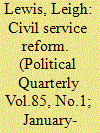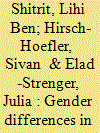|
|
|
Sort Order |
|
|
|
Items / Page
|
|
|
|
|
|
|
| Srl | Item |
| 1 |
ID:
130956


|
|
|
|
|
| Publication |
2014.
|
| Summary/Abstract |
In July 2013 the UK's coalition government published "The Civil Service Reform Plan - One Year on", reporting on progress against minister Frances Maude's objectives to shake up the civil service. This followed various reported disagreements between ministers and civil servants over policy implementation, and a research report commissioned by the government from think tank IPPR into lessons from overseas for civil service reform. This trio of short articles reviews the government's proposals from three perspectives: that of the lead author of the IPPR report, a former senior civil servant, and the chair of the House of Commons Public Administration Committee (PASC) which oversees the civil service. The authors take differing views on the proposals, which include introduction of 'extended ministerial offices', and greater control by ministers over choosing their civil servants. Should these be seen as useful next steps, worrying developments, and/or large and important enough to merit a Commission on the civil service, as PASC has suggested?
|
|
|
|
|
|
|
|
|
|
|
|
|
|
|
|
| 2 |
ID:
130955


|
|
|
|
|
| Publication |
2014.
|
| Summary/Abstract |
In July 2013 the UK's coalition government published "The Civil Service Reform Plan - One Year on", reporting on progress against minister Frances Maude's objectives to shake up the civil service. This followed various reported disagreements between ministers and civil servants over policy implementation, and a research report commissioned by the government from think tank IPPR into lessons from overseas for civil service reform. This trio of short articles reviews the government's proposals from three perspectives: that of the lead author of the IPPR report, a former senior civil servant, and the chair of the House of Commons Public Administration Committee (PASC) which oversees the civil service. The authors take differing views on the proposals, which include introduction of 'extended ministerial offices', and greater control by ministers over choosing their civil servants. Should these be seen as useful next steps, worrying developments, and/or large and important enough to merit a Commission on the civil service, as PASC has suggested?
|
|
|
|
|
|
|
|
|
|
|
|
|
|
|
|
| 3 |
ID:
156655


|
|
|
|
|
| Summary/Abstract |
The relationship between gender and political aggression is hotly debated and the empirical evidence is often mixed. While many surveys find a gender gap, with women less supportive of politically motivated aggression and violence than men, numerous case studies point to women’s active involvement in political violence and refute the association of women with peacefulness. This article argues that the gender–aggression relation depends upon (1) the type of political aggression under study (i.e. direct vs. indirect political aggression), and (2) contextual factors, notably the salience of a protracted conflict. Using original datasets representing Israeli Jews (N = 3,126) we found that in the context of protracted conflict, gender has a unique effect on support for indirect forms of political aggression, over and above other central predictors of political aggression (i.e. political orientation and threat perceptions), such that women are actually more supportive of politically motivated social distancing and exclusion of out-groups in conflict as compared to men. Women and men, however, do not differ in their support for direct, politically motivated, violent acts against government officials. Results also shed light on potential mechanisms underlying these differences (and lack thereof), in the context of protracted conflict. The findings cast further doubt on the stereotype of ‘peaceful women’ and point to the need for policymakers concerned with conflict resolution to address context-related factors when considering the gender-based differences in political aggression.
|
|
|
|
|
|
|
|
|
|
|
|
|
|
|
|
|
|
|
|
|